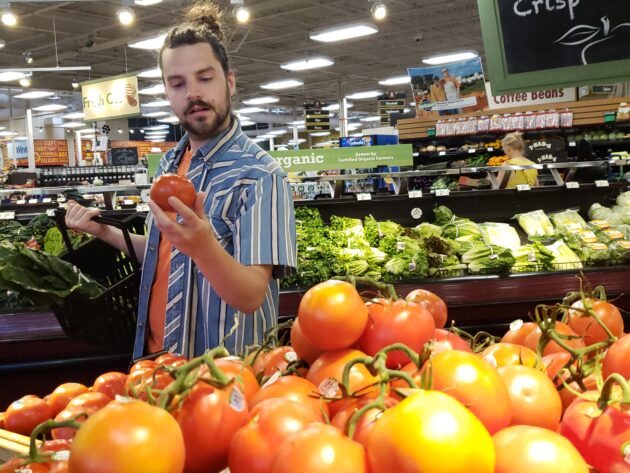Grocery delivery startup Dumpling raises $3M to democratize the gig economy, challenging Instacart from Amazon’s backyard

Seattle startup Dumpling raised $3 million for a personal shopping platform that flips the economics of the gig economy upside down. The investment round was led by Floodgate with participation from Fuel Capital.
Dumpling originally started as a platform for workers to voice their opinions about the companies they worked for. That effort led to a major realization that gig workers — especially those working for Instacart — really didn’t like how the apps were treating them.

“We learned how crazy it was to be an on-demand grocery shopper and how that ultimately affected customers,” said Dumpling co-founder and co-CEO Joel Shapiro. Instacart workers have been vocal in their complaints about changes to the company policies that have cut wages.
So Dumpling set out to build a different kind of experience that put the shoppers at the center, treating them as independent business owners rather than variables on a supply-demand curve. The philosophy is that empowering the workers will lead to better service, which should encourage customers to buy more food more often.
“Dumpling is the first service that supports a new breed of solo entrepreneurs — ones who today seek to differentiate the service they provide by adding their personal touch to local services to meet consumers’ increasing expectations,” Floodgate partner Ann Miura-Ko said in a statement.
Floodgate was a seed investor in both Lyft and Taskrabbit. TaskRabbit founder Leah Busque Solivan is a general partner at Fuel Capital.
Shapiro points out that many of the most expensive grocery items — produce, meat and fish — are also things that people are least likely to trust another person to buy. You may not care who grabs your toilet paper, but you want a trusted source to pick the perfect avocado.
Dumpling’s shoppers set their own flat-rate shopping and delivery fee and earn a minimum 10 percent tip, although customers can choose to tip more. On average, shoppers make $32 per order, which the company says is roughly triple the average earnings per order on other grocery delivery platforms.
Instacart shopper’s don’t have the same level of control over their earnings, but the company recently put in place a $10 minimum payment for all grocery “batches” following widespread criticism of the company’s pricing methods.
Aside from the compensation model, Dumpling is also different in that customers personally select their shoppers, rather than being randomly matched based on supply and demand. This means that the service is better for people who schedule their pickups in advance rather than those who want on-call grocery delivery. Over time, Dumpling says shoppers learn their repeat customers’ preferences, leading to a higher level of service.
“People love their mailman, dog walkers, and babysitters. I want to foster that kind of relationship with my customers, especially for people who really value the importance of the connection of food and community,” Wolfgang Eastman, a personal shopper who uses Dumpling, said in a statement.
Cracking the grocery delivery code has proven exceedingly difficult, even for industry leaders. Amazon Fresh first launched in 2007 but struggled for years to get meaningful traction, and the company has continued to invest in expanding Whole Foods delivery. Only 3 percent of grocery orders are fulfilled online, compared with 10 percent of all retail.
So what would get people to shop for groceries online? For Dumpling, the answer is trust.
“Our philosophy is the shopper is adding the value,” Shapiro said. Dumpling says that its average order size is $190, higher than the industry average of $152, according to Rakuten Intelligence. The service is used by 500 shoppers in 37 states.
Larger orders are important not only because they signal more trust from the consumer, but also because Dumpling earns a percentage of each order.
Shapiro co-founded the company with co-CEO Nate D’Anna and CTO Thomas Schoellhammer. Dumpling has 9 employees and splits its headquarters between Seattle and Berkeley, Calif.
Conclusion: So above is the Grocery delivery startup Dumpling raises $3M to democratize the gig economy, challenging Instacart from Amazon’s backyard article. Hopefully with this article you can help you in life, always follow and read our good articles on the website: Ngoinhanho101.com





